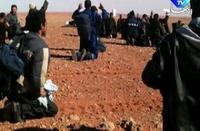-
Algeria: use of overwhelming force against hostage-takers was necessary
As the grim toll of the 4-day operation to wrest control of the Algerian gas drilling site becomes clearer, debate continues about the tactics the Algerian military pursued, which some in Western capitals consider rushed and heavy-handed. Algeria says it had no choice: the initial plan of the terrorists was to grab two-dozen foreign workers, take them to the nearby airport of Amena, hijack a plane, and fly them to Mali, then ask Western government for a hefty ransom. When that plan failed, the terrorists began preparations to blow up the entire complex, killing themselves and the 790 workers kept as prisoners on the site. Algeria says that if it did not act quickly, and with overwhelming force, the death toll would have been far higher.
-
-
Ariz. Governor Brewer offers a softer approach to illegal immigration
Arizona governor Jan Brewer has made a name for herself for always taken a her hard line stance on the subject of illegal immigration, but recently she has begun to soften her tone on the issue. While Brewer’s position has not changed — she prefers border security over immigration reform — her tone has, as the State of the State address last week suggests.
-
-
More states move to restrict access to personal information of gun holders
Currently, thirty-five states do not provide access to information on people who have gun licenses, except to law enforcement. Some of the states where access to such information is permitted, are now moving toward restricting such access.
-
-
Thwarting facial-recognition, photo-tagging software

Information about when and where photographed subjects were when their pictures were taken is readily disclosed through photos taken, and the information is disclosed and distributed without their permission. The problem has become even worse due to the popularization of portable terminals with built-in cameras and developments in SNS and image search technologies. Japanese researchers offer a solution: goggles or glasses which, when equipped with near-infrared LED emitter. :
-
-
Thorium holds promise of safer, cleaner nuclear power
Thorium as nuclear fuels has drawbacks, but its main advantage includes generating far less toxic residue. The majority of the mineral is used during the fission process, and it can burn existing stockpiles of plutonium and hazardous waste, saving the need to transport it and bury the waste in concrete. If thorium becomes available as a source of energy in the future, the world will rely less on coal and gas, and wind turbines will become a thing of the past. The risk of a global energy crunch will decrease considerably.
-
-
Algerian hostage drama over; 48 hostages, 32 terrorists dead

Algerian forces have taken control of the gas drilling site near the Algeria-Libya border, and the authorities are trying to determine the human toll of the 4-day drama. Initial estimates indicate that forty-eight hostages and thirty-two terrorists have died in the fire exchanges between the hostage takers and the Algerian military. The Algerian government says that five of the Islamist terrorists were captured alive. The forty Islamist hostage-takers came from six different countries, and trained for the operation in a base in Islamist-controlled north Mali.
-
-
French defense minister: campaign goal is “total reconquest” of Mali
French fighter planes continued their attacks on training bases, weapon storage sites, and Islamist troop concentrations in north Mali, paying special attention the Islamists presence in and around the major cities of Gao and Timbuktu.
-
-
Many hostages dead in clumsy Algerian raid on gas drilling site
Sketchy news from the Sahara desert gas field site indicates that up to thirty hostages may have been killed by their Islamic captors as Algerian special forces attacked the site. Algerian officials said that the thirty dead included eight Algerians, two Britons, two Japanese, and one French national. The nationality of the other seventeen hostages killed at the site had not been established. The British government more openly, and the French and U.S. governments more elliptically, raised questions about the tactics used by the Algerian military: Algerian helicopter gunships strafed the living quarters at the site when both hostages and terrorists were inside; helicopters also destroyed four jeeps carrying both jihadists and hostages. It appears that most of the hostages were killed by Algerian fire, not by the terrorists.
-
-
Metamaterial sensor improves security, collision avoidance

Engineers have developed a novel sensor which is more efficient, versatile, and cheaper for potential use in such applications as airport security scanners and collision avoidance systems for aircraft, cars, or maritime vessels.
-
-
Personal genetic information vulnerable to hacking
Using only a computer, an Internet connection, and publicly accessible online resources, a team of researchers has been able to identify nearly fifty individuals who had submitted personal genetic material as participants in genomic studies.
-
-
Minnesota counties police make big money from drug seizures
In 2011, law enforcement in southern Minnesota made a significant profit off crime busts. State Auditor Rebecca Otto released the Criminal Forfeitures Report last month, which offers information on the amount of cash and property seized by Minnesota law enforcement agencies.
-
-
Police officers in Louisiana do not have to look for a ride home
Tighter budgets have had an effect on police departments everywhere. In Indianapolis, Indiana, and many other cities, police departments now charge officers a fee to take home their squad cars. Police departments in central Louisiana resist this trend. “This [taking home a squad car] is not a privilege,” says the director of the National Fraternal Order of Police. “It really is about maximizing response times and the ability of officers to be where they need to be.”
-
-
Privately run detention center locks up immigrants for months

Hundreds of immigrants who have committed minor offenses have been locked up for weeks or months at a time in a Broward County, Florida facility run by a private company. The majority of the immigrants have been accused of entering the country illegally or staying longer than were allowed to.
-
-
Obama unveils comprehensive proposal to curb gun violence
President Obama earlier today proposed the most comprehensive gun-control policies in a generation. He also initiated twenty-three separate executive actions aiming to curb what he called “the epidemic of gun violence in this country.” In addition to executive measures, the president called on Congress to pass legislation to ban assault weapons and high-capacity magazines for civilian use, and to require universal background checks for all gun buyers.
-
-
House approves $50.7 billion Sandy relief bill
The House Tuesday night approved, by a vote of 241 to 180, the $50.7 billion in a Sandy relief package, the second installment of a $60.4 billion package requested by the White House and approved by the Senate (last week the House approved the $9.7 million flood-insurance part of the package). Effort by conservative members of the House to offset a part of the bill’s cost with across-the-board federal budget cuts failed on a 258-162 vote.
-
More headlines
The long view
Factories First: Winning the Drone War Before It Starts
Wars are won by factories before they are won on the battlefield,Martin C. Feldmann writes, noting that the United States lacks the manufacturing depth for the coming drone age. Rectifying this situation “will take far more than procurement tweaks,” Feldmann writes. “It demands a national-level, wartime-scale industrial mobilization.”
No Nation Is an Island: The Dangers of Modern U.S. Isolationism
The resurgence of isolationist sentiment in American politics is understandable but misguided. While the desire to refocus on domestic renewal is justified, retreating from the world will not bring the security, prosperity, or sovereignty that its proponents promise. On the contrary, it invites instability, diminishes U.S. influence, and erodes the democratic order the U.S. helped forge.
Fragmented by Design: USAID’s Dismantling and the Future of American Foreign Aid
The Trump administration launched an aggressive restructuring of U.S. foreign aid, effectively dismantling the United States Agency for International Development (USAID). The humanitarian and geopolitical fallout of the demise of USAID includes shuttered clinics, destroyed food aid, and China’s growing influence in the global south. This new era of American soft power will determine how, and whether, the U.S. continues to lead in global development.
Water Wars: A Historic Agreement Between Mexico and US Is Ramping Up Border Tension
As climate change drives rising temperatures and changes in rainfall, Mexico and the US are in the middle of a conflict over water, putting an additional strain on their relationship. Partly due to constant droughts, Mexico has struggled to maintain its water deliveries for much of the last 25 years, deliveries to which it is obligated by a 1944 water-sharing agreement between the two countries.
How Disastrous Was the Trump-Putin Meeting?
In Alaska, Trump got played by Putin. Therefore, Steven Pifer writes, the European leaders and Zelensky have to “diplomatically offer suggestions to walk Trump back from a position that he does not appear to understand would be bad for Ukraine, bad for Europe, and bad for American interests. And they have to do so without setting off an explosion that could disrupt U.S.-Ukrainian and U.S.-European relations—all to the delight of Putin and the Kremlin.”
How Male Grievance Fuels Radicalization and Extremist Violence
Social extremism is evolving in reach and form. While traditional racial supremacy ideologies remain, contemporary movements are now often fueled by something more personal and emotionally resonant: male grievance.
